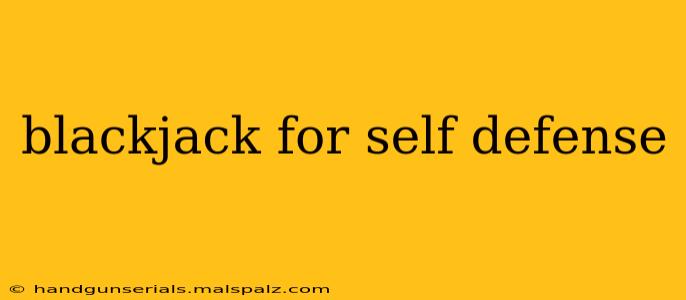Blackjacks, also known as saps or coshes, have a long and controversial history, often associated with law enforcement and organized crime. However, understanding their use in self-defense requires a nuanced perspective, acknowledging both their potential effectiveness and significant legal ramifications. This guide will explore the intricacies of using a blackjack for self-defense, focusing on legality, effectiveness, training, and ethical considerations.
Legality of Blackjacks for Self-Defense
The legality of owning and carrying a blackjack varies significantly depending on your location. Many jurisdictions have strict regulations or outright bans on these weapons. Before even considering using a blackjack for self-defense, it's crucial to research and understand the laws in your specific state, county, and even city. Possession of an illegal weapon can lead to severe penalties, including hefty fines and imprisonment. This legal research is non-negotiable; ignorance of the law is no excuse.
Effectiveness of a Blackjack as a Self-Defense Tool
The effectiveness of a blackjack rests on several factors, most importantly proper training and technique. Used incorrectly, it can be ineffective or even dangerous to the user. A well-placed strike can incapacitate an attacker, but this requires precise aim and considerable force. Targets often include the limbs (thighs, biceps, forearms) and less vital areas to avoid serious injury. However, misuse can lead to unintended harm to both the attacker and the defender.
Advantages:
- Concealability: Blackjacks can be relatively easily concealed, unlike larger weapons.
- Substantial Impact: A well-aimed strike can deliver significant concussive force, potentially incapacitating an attacker.
- Less Lethal (Potentially): Compared to firearms or knives, blackjacks offer a potentially less lethal option, although this depends entirely on the force used and the area struck.
Disadvantages:
- Requires Training: Proper technique is essential for effective and safe use. Improper use can result in injury to both the user and the attacker.
- Limited Range: Blackjacks are short-range weapons, requiring close proximity to the attacker.
- Legal Ramifications: As previously mentioned, legal repercussions for possession and use can be severe.
Training and Proper Technique
Crucially, attempting to use a blackjack for self-defense without proper training is highly discouraged. The risk of injury to yourself and the attacker is substantial. Seeking instruction from a qualified self-defense instructor experienced in blackjack techniques is paramount. They can teach you proper striking techniques, target areas, and defensive maneuvers. Training should also cover legal implications and ethical considerations.
Ethical Considerations
Using any weapon for self-defense involves a moral responsibility. The use of force should always be a last resort, only employed when facing imminent danger. Even with a blackjack, the potential for serious injury exists. Consider the level of force necessary and the potential consequences of your actions. Over-reliance on a weapon can be detrimental to developing other essential self-defense skills such as situational awareness and de-escalation techniques.
Alternatives to Blackjacks for Self-Defense
Before considering a blackjack, explore less lethal but equally effective alternatives:
- Self-defense classes: Learning effective techniques to disarm an attacker or escape a dangerous situation.
- Pepper spray: A non-lethal option for creating distance and causing temporary incapacitation.
- Personal alarm: To attract attention and deter attackers.
Conclusion
The use of a blackjack for self-defense is a complex issue with significant legal and ethical considerations. While it can be an effective tool in the right hands, proper training, awareness of legal restrictions, and understanding of ethical implications are absolutely crucial. Always prioritize de-escalation and safer alternatives before resorting to any form of weapon. Consult legal professionals and qualified self-defense instructors for accurate and comprehensive guidance. Remember, responsible self-defense is about protecting yourself while minimizing harm.

